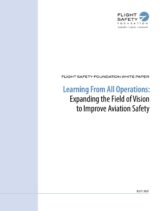Concept Notes and Case Studies
In order to facilitate learning from all operations there is a need for a conceptual framework that incorporates taxonomies and concepts based on the existing risk and hazard terminology but expanded to include resilience and adaptation best suited for use for both abnormal and normal operations. The suggested framework should be suitable for understanding of work-as-done and for collecting and analyzing diverse sources of data on the real world resilient behavior of operators. To define the Learning From All Operations conceptual framework, the Foundation offers the following series of Concept Notes. Also below is a case study of how Learning From All Operations was used to select a strategy to mitigate an operational safety issue.
Concept Note 1: The Need for Learning From All Operations
Concept Note 2: Systems Approach
Concept Note 3: Safety Envelope and Operational Limits Assumptions
Concept Note 4: Patterns of Operational Resilience
Concept Note 5: Three Forces Model of System Adaptation
Concept Note 6: Mechanism of Operational Resilience
Concept Note 7: Pressures, Adaptations and Manifestations Framework
Case Study: Take-Off Rotation
Case Study: Learning With Flight Replay Animations
Case Study: Departing and Arriving Aircraft Spacing NEW!
Additional Resources
Integrating Learning From All Operations into the Components of a Safety Management System (SMS)
This paper outlines how incorporating Learning From All Operations into existing SMS may help organizations manage safety risks effectively, create operational capacity and make them resilient in the face of expected and unexpected events.
How Operators Can Create Safety in an Uncertain World, a paper by James Burnell, Tom Laursen and Joji Waites, examines the evolving understanding of “complex adaptive systems” in which it is accepted that uncertainty is part of everyday operations. The paper also explores “adaptive capacity,” which helps achieve high reliability despite the challenges brought by complex operations.
